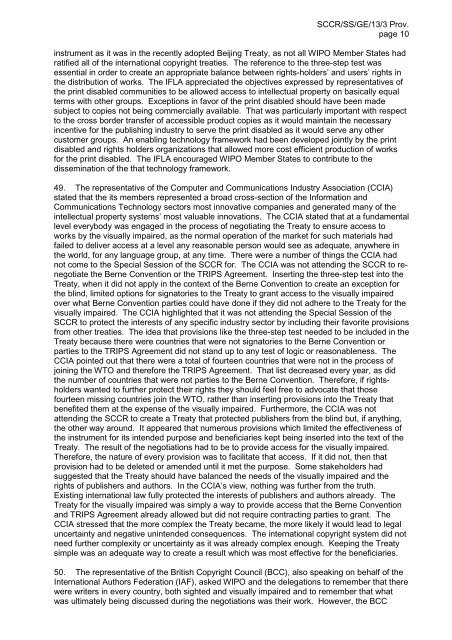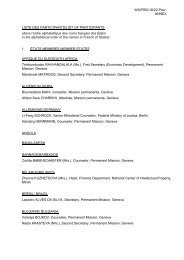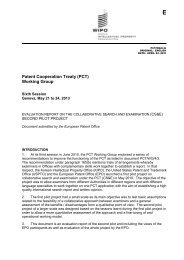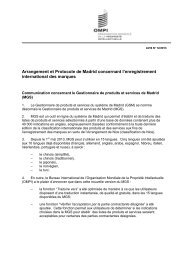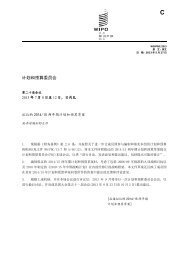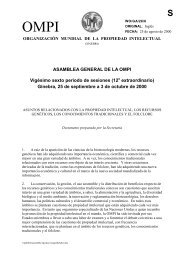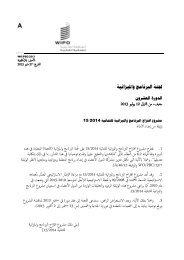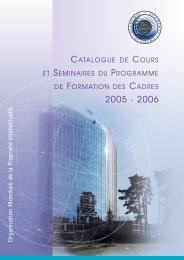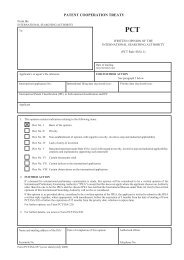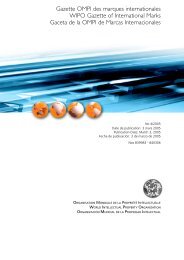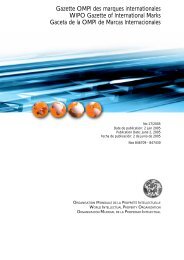Standing Committee on Copyright and Related Rights - WIPO
Standing Committee on Copyright and Related Rights - WIPO
Standing Committee on Copyright and Related Rights - WIPO
- No tags were found...
You also want an ePaper? Increase the reach of your titles
YUMPU automatically turns print PDFs into web optimized ePapers that Google loves.
SCCR/SS/GE/13/3 Prov.page 10instrument as it was in the recently adopted Beijing Treaty, as not all <strong>WIPO</strong> Member States hadratified all of the internati<strong>on</strong>al copyright treaties. The reference to the three-step test wasessential in order to create an appropriate balance between rights-holders’ <strong>and</strong> users’ rights inthe distributi<strong>on</strong> of works. The IFLA appreciated the objectives expressed by representatives ofthe print disabled communities to be allowed access to intellectual property <strong>on</strong> basically equalterms with other groups. Excepti<strong>on</strong>s in favor of the print disabled should have been madesubject to copies not being commercially available. That was particularly important with respectto the cross border transfer of accessible product copies as it would maintain the necessaryincentive for the publishing industry to serve the print disabled as it would serve any othercustomer groups. An enabling technology framework had been developed jointly by the printdisabled <strong>and</strong> rights holders organizati<strong>on</strong>s that allowed more cost efficient producti<strong>on</strong> of worksfor the print disabled. The IFLA encouraged <strong>WIPO</strong> Member States to c<strong>on</strong>tribute to thedisseminati<strong>on</strong> of the that technology framework.49. The representative of the Computer <strong>and</strong> Communicati<strong>on</strong>s Industry Associati<strong>on</strong> (CCIA)stated that the its members represented a broad cross-secti<strong>on</strong> of the Informati<strong>on</strong> <strong>and</strong>Communicati<strong>on</strong>s Technology sectors most innovative companies <strong>and</strong> generated many of theintellectual property systems’ most valuable innovati<strong>on</strong>s. The CCIA stated that at a fundamentallevel everybody was engaged in the process of negotiating the Treaty to ensure access toworks by the visually impaired, as the normal operati<strong>on</strong> of the market for such materials hadfailed to deliver access at a level any reas<strong>on</strong>able pers<strong>on</strong> would see as adequate, anywhere inthe world, for any language group, at any time. There were a number of things the CCIA hadnot come to the Special Sessi<strong>on</strong> of the SCCR for. The CCIA was not attending the SCCR to renegotiatethe Berne C<strong>on</strong>venti<strong>on</strong> or the TRIPS Agreement. Inserting the three-step test into theTreaty, when it did not apply in the c<strong>on</strong>text of the Berne C<strong>on</strong>venti<strong>on</strong> to create an excepti<strong>on</strong> forthe blind, limited opti<strong>on</strong>s for signatories to the Treaty to grant access to the visually impairedover what Berne C<strong>on</strong>venti<strong>on</strong> parties could have d<strong>on</strong>e if they did not adhere to the Treaty for thevisually impaired. The CCIA highlighted that it was not attending the Special Sessi<strong>on</strong> of theSCCR to protect the interests of any specific industry sector by including their favorite provisi<strong>on</strong>sfrom other treaties. The idea that provisi<strong>on</strong>s like the three-step test needed to be included in theTreaty because there were countries that were not signatories to the Berne C<strong>on</strong>venti<strong>on</strong> orparties to the TRIPS Agreement did not st<strong>and</strong> up to any test of logic or reas<strong>on</strong>ableness. TheCCIA pointed out that there were a total of fourteen countries that were not in the process ofjoining the WTO <strong>and</strong> therefore the TRIPS Agreement. That list decreased every year, as didthe number of countries that were not parties to the Berne C<strong>on</strong>venti<strong>on</strong>. Therefore, if rightsholderswanted to further protect their rights they should feel free to advocate that thosefourteen missing countries join the WTO, rather than inserting provisi<strong>on</strong>s into the Treaty thatbenefited them at the expense of the visually impaired. Furthermore, the CCIA was notattending the SCCR to create a Treaty that protected publishers from the blind but, if anything,the other way around. It appeared that numerous provisi<strong>on</strong>s which limited the effectiveness ofthe instrument for its intended purpose <strong>and</strong> beneficiaries kept being inserted into the text of theTreaty. The result of the negotiati<strong>on</strong>s had to be to provide access for the visually impaired.Therefore, the nature of every provisi<strong>on</strong> was to facilitate that access. If it did not, then thatprovisi<strong>on</strong> had to be deleted or amended until it met the purpose. Some stakeholders hadsuggested that the Treaty should have balanced the needs of the visually impaired <strong>and</strong> therights of publishers <strong>and</strong> authors. In the CCIA’s view, nothing was further from the truth.Existing internati<strong>on</strong>al law fully protected the interests of publishers <strong>and</strong> authors already. TheTreaty for the visually impaired was simply a way to provide access that the Berne C<strong>on</strong>venti<strong>on</strong><strong>and</strong> TRIPS Agreement already allowed but did not require c<strong>on</strong>tracting parties to grant. TheCCIA stressed that the more complex the Treaty became, the more likely it would lead to legaluncertainty <strong>and</strong> negative unintended c<strong>on</strong>sequences. The internati<strong>on</strong>al copyright system did notneed further complexity or uncertainty as it was already complex enough. Keeping the Treatysimple was an adequate way to create a result which was most effective for the beneficiaries.50. The representative of the British <strong>Copyright</strong> Council (BCC), also speaking <strong>on</strong> behalf of theInternati<strong>on</strong>al Authors Federati<strong>on</strong> (IAF), asked <strong>WIPO</strong> <strong>and</strong> the delegati<strong>on</strong>s to remember that therewere writers in every country, both sighted <strong>and</strong> visually impaired <strong>and</strong> to remember that whatwas ultimately being discussed during the negotiati<strong>on</strong>s was their work. However, the BCC


